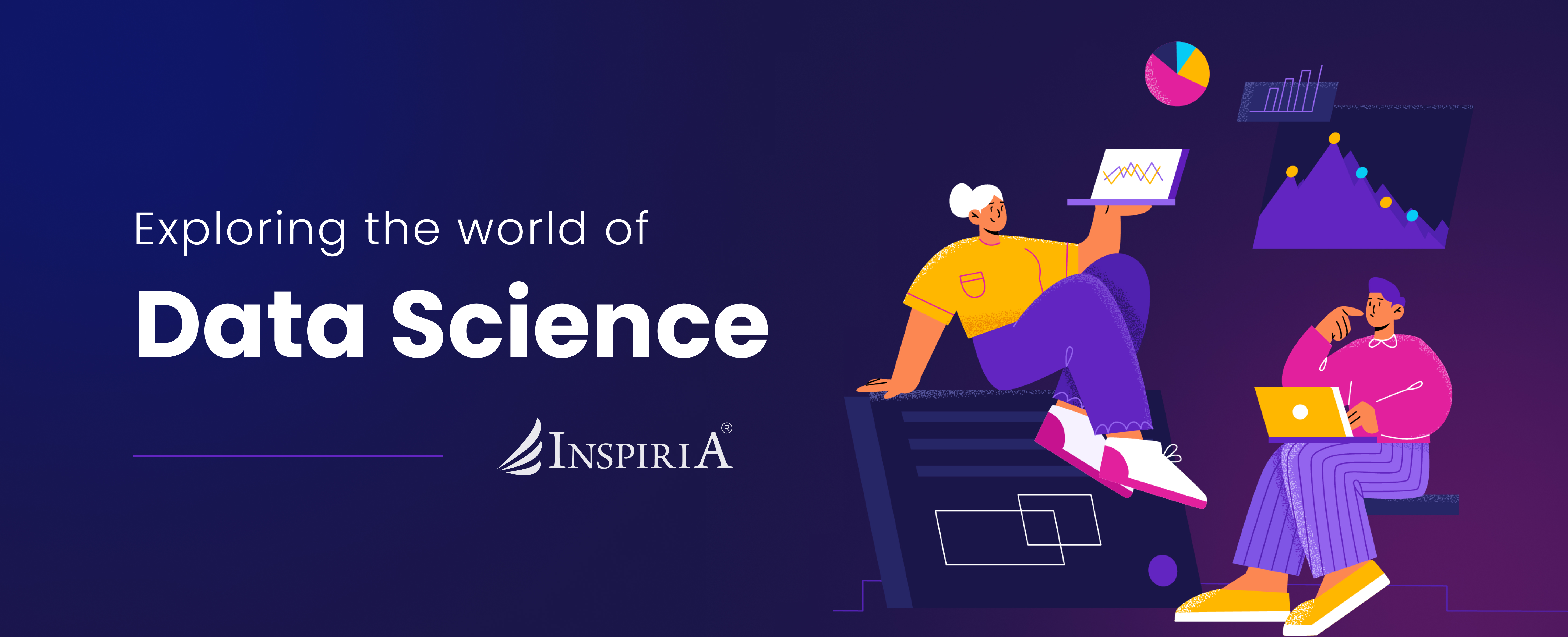In the rapidly evolving landscape of technology and data-driven decision-making, the demand for skilled professionals in data science has surged exponentially. Businesses across industries are seeking individuals equipped with the expertise to derive insights from vast amounts of data, driving innovation and competitive advantage. In response to this demand, educational institutions have introduced specialized programs such as Bachelor of Science (B.Sc.) in Data Science to prepare students for careers in this field.
Welcome to this comprehensive guide, designed to provide you with invaluable insights into pursuing a B.Sc. in Data Science course. Whether you’re a prospective student weighing your academic options or an enthusiast seeking to understand the essence of this field, this guide aims to provide a clear idea of the program, explore its curriculum, career prospects, and the skills required to thrive in the realm of data science.
What is Data Science?
Data science is an interdisciplinary field that involves extracting insights and knowledge from structured and unstructured data using scientific methods, processes, algorithms, and systems. It combines elements from various disciplines such as statistics, mathematics, computer science, and domain expertise to analyze complex data sets and derive actionable insights.
In essence, data science encompasses the entire data lifecycle. The data lifecycle involves generating, collecting, processing, storing, managing, analyzing, visualizing, and interpreting data. It starts with data creation and ends with drawing insights for informed decision-making. Each step is vital in making sense of data and utilizing it effectively.
Data scientists use a variety of techniques to uncover patterns, trends, and relationships within data. The insights generated by data science are used to inform decision-making processes, solve complex problems, and drive innovation across industries such as healthcare, finance, marketing, telecommunications, and many others.
With the increasing availability of data and advancements in technology, data science has become an indispensable tool for organizations seeking to gain a competitive edge and make data-driven decisions.
Bachelor courses available for Data Science
In India, several universities and colleges offer Bachelor’s degree programs in Data Science or related fields. These programs typically cover a range of courses in mathematics, statistics, computer science, and domain-specific topics related to data analysis and interpretation. Here are some examples of Bachelor courses available in Data Science in India:
B.Sc. in Data Science

The B.Sc. Data Science course is a four year undergraduate program. It provides students with a comprehensive understanding of data science principles, statistical analysis, and key programming languages such as Python, R, and SQL. Alongside, students explore advanced topics like machine learning, data visualization, and big data technologies, preparing them for a wide range of applications across various sectors including Business, Marketing, Healthcare, and Banking.
Through hands-on experience, students develop the agility to manage and analyze diverse datasets effectively. The program aims to equip graduates with the skills to conduct data-driven investigations, visualize data proficiently, and derive actionable insights by identifying patterns and predicting trends, empowering them to address real-world challenges and make informed decisions.
B.Tech/B.E. in Data Science and Engineering
Some academic institutions offer engineering programs specializing in Data Science and Engineering. These courses typically encompass a wide array of subjects, including computer science, engineering principles, and specialized modules in data analytics and machine learning.The Bachelor of Technology (BTech) program in Data Science and Engineering is tailored to equip students with the necessary skills for success in the field of data science.
The BTech Data Science and Engineering program extends over four years, organized into eight semesters. Throughout the course duration, students engage with topics such as data cleansing, collection methodologies, and data manipulation techniques essential for conducting complex data analyses.
B.Sc. in Applied Mathematics and Data Science
The B.Sc. in Applied Mathematics and Data Science course is an interdisciplinary program that combines mathematics with data science, providing students with a solid understanding of mathematical concepts and their applications in data analysis, modeling, and prediction.
B.Sc. in Statistics and Data Science
The B.Sc. in Applied Statistics and Data Analytics is a three-year undergraduate course that integrates Computer Science, Data Analytics, Machine Learning, and Statistics. It enables professionals to effectively collect, analyze, and utilize data and statistics to extract valuable insights and make informed decisions. This interdisciplinary course unlocks diverse career opportunities across sectors that heavily rely on data-driven expertise.
This program delves into statistical methods and techniques essential for analyzing and interpreting data, covering topics such as probability theory, regression analysis, and experimental design. It offers a blend of theoretical and applied elements in modern statistics, providing students with the necessary training and practical experience to model, analyze, and interpret real-world data in economic, industrial, and research contexts.
B.Tech/B.E. in Computer Science with a specialization in Data Science
The B.Tech program in Computer Science & Engineering (Data Science) is a four year undergraduate course. It is all about mastering Computer Science through Data Science, focusing on advanced Machine Learning techniques. It’s a hands-on program that prepares you to build business models for analytics. Data science offers exciting career opportunities, and this program introduces you to various applications of data analysis and statistics.
Many engineering colleges offer Bachelor’s degree programs in Computer Science with specializations or elective courses in Data Science. These programs cover essential computer science topics along with additional training in data analysis, machine learning, and artificial intelligence.
B.Sc. in Artificial Intelligence and Data Science
The B.Sc. in Artificial Intelligence and Data Science is a three-year undergraduate program that seamlessly integrates the fields of data science and artificial intelligence. Students are equipped with the necessary skills to perform data-driven analyses using both statistical methods and AI techniques. The curriculum aims to familiarize students with the technologies and practices relevant to AI and data science, emphasizing their application in solving real-world challenges.
This program offers a comprehensive study of artificial intelligence alongside data science, laying the foundation for careers in AI development, machine learning, and data-driven decision-making. Through hands-on learning and practical projects, students gain a deep understanding of how AI and data science intersect, preparing them for roles where they can leverage these technologies to drive innovation and solve complex problems.
B.Sc. in Business Analytics and Data Science
The B.Sc. in Business Analytics and Data Science is a 3 to 4-year undergraduate program that emphasizes the application of data science techniques in various business contexts. Students delve into areas such as marketing analytics, financial analysis, supply chain management, and customer relationship management, gaining practical skills to address real-world business challenges.
Integrated B.Tech/M.Tech in Data Science
The Integrated B.Tech/M.Tech in Data Science course is a 5 year program at the undergraduate level. Some institutions offer this integrated Bachelor-Master programs in Data Science, allowing students to pursue advanced studies in data science and related fields in a streamlined manner.
Course structure of B.Sc. in Data Science
The course curriculum or structure of B.Sc. in Data Science courses may vary depending on the institution offering the program and its specific focus areas or specializations. However, a general overview of the typical components of B.Sc. in Data Science course is given below:
1st Year: Foundations of Data Science
- Mathematics for Data Science
- Calculus
- Linear Algebra
- Probability and Statistics
- Programming Fundamentals
- Introduction to Python
- Data Structures and Algorithms
- Object-Oriented Programming
- Introduction to Data Science
- Overview of Data Science
- Data Acquisition and Cleaning
- Exploratory Data Analysis
- Database Management Systems
- Relational Database Concepts
- SQL Fundamentals
- Database Design and Normalization
2nd Year: Core Data Science Techniques
- Machine Learning
- Supervised Learning
- Unsupervised Learning
- Model Evaluation and Selection
- Data Visualization and Communication
- Data Visualization Principles
- Tools and Techniques (e.g., Matplotlib, Seaborn)
- Storytelling with Data
- Big Data Analytics
- Introduction to Big Data Technologies (e.g., Hadoop, Spark)
- Distributed Computing
- Processing and Analyzing Large Datasets
- Statistical Methods for Data Science
- Advanced Statistical Techniques
- Experimental Design
- Multivariate Analysis
3rd Year: Advanced Topics and Specializations
- Deep Learning and Neural Networks
- Introduction to Neural Networks
- Convolutional Neural Networks (CNNs)
- Recurrent Neural Networks (RNNs)
- Natural Language Processing (NLP)
- Text Preprocessing and Tokenization
- Sentiment Analysis
- Named Entity Recognition
- Advanced Machine Learning
- Ensemble Methods
- Dimensionality Reduction Techniques
- Advanced Model Tuning and Optimization
- Elective Specializations
- Business Analytics
- Healthcare Analytics
- Financial Analytics
- Social Media Analytics
4th Year: Practical Applications and Capstone Project
- Capstone Project
- Real-world Data Science Project
- Problem Identification, Data Collection, Analysis, and Presentation
- Mentorship from Faculty or Industry Experts
- Internship/Industrial Training
- Hands-on Experience in Industry Settings
- Application of Data Science Techniques in Real-world Scenarios
- Soft Skills Development
- Communication Skills Workshops
- Teamwork and Collaboration Exercises
- Critical Thinking and Problem-solving Seminars
Eligibility criteria for B.Sc. in Data Science course
Eligibility criteria for pursuing a B.Sc. in Data Science in India generally include:
- Completion of higher secondary education (10+2) or equivalent from a recognized board is required.
- Prospective students must meet the minimum academic requirements as specified by the institution, often involving achieving a certain grade point average or scoring thresholds in relevant subjects.
- Proficiency in mathematics, including algebra, calculus, and statistics, is essential, as these subjects form the foundation of data analysis and interpretation.
- Basic understanding of programming languages, such as Python or R, might be necessary, as they are commonly used in data science applications.
- Proficiency in the English language is typically required, given that coursework and materials may be delivered in English.
- Some institutions may require applicants to pass entrance exams or interviews as part of the admission process to assess their aptitude and suitability for the program.
Specific prerequisites or additional requirements may vary depending on the institution, so it’s essential for prospective students to review the admission guidelines provided by each institution carefully.
Skills required in the field of Data Science
The field of Data Science requires a blend of technical and non-technical skills. The following are necessary skills for those in this field:
Programming Languages and Databases
Understanding programming languages is crucial in data science as it enables manipulation of data and application of algorithms. Key languages include Python, R Programming, SQL, and Scala. Additionally, proficiency in databases like MongoDB and MySQL is essential for structured data storage and retrieval.
Mathematical Proficiency
A solid grasp of mathematics and statistics is indispensable for data scientists. Topics such as linear algebra, statistics, calculus, and probability distributions are essential for tasks like regression, dimensionality reduction, and vector modeling.
Big Data Management
Managing large volumes of data requires specialized tools like KNIME, RapidMiner, Integrate.io, Hadoop, and Spark. These tools facilitate data preparation, storage, processing, and analysis for handling big data challenges effectively.
Data Analysis
Data scientists need to analyze and visualize data effectively. Tools like Tableau, Power BI, and Qlikview are commonly used for data analysis and visualization. Additionally, libraries like D3.js facilitate data visualization in web browsers.
Problem-Solving Skills
Data scientists must possess strong problem-solving skills to address complex challenges effectively. Breaking down problems into manageable parts and developing creative solutions are essential for success in the field of data science.
Teamwork and Collaboration
Data scientists frequently work in interdisciplinary teams, so strong teamwork and collaboration skills are essential. This involves listening to others, sharing ideas, and working together to achieve common goals.
Ethical Awareness
Data scientists handle sensitive information and must adhere to ethical standards and privacy regulations. This involves understanding the ethical implications of their work, respecting privacy rights, and ensuring data security and integrity.
Top programming languages required in Data science Profession
Programming languages are essential in data science because they enable data manipulation, analysis, modeling, visualization, automation, and scalability, empowering data scientists to extract insights and make data-driven decisions efficiently. So here are the top 6 programming languages used in the field of Data Science
Python
Python stands out as a versatile, general-purpose programming language widely utilized in data science. Renowned for its simple syntax, readability, and cross-platform compatibility, Python is favored by developers of all skill levels. With its vast community support and plethora of resources, Python is an excellent choice for beginners and professionals alike. Its suitability for data science makes it particularly appealing to newcomers entering the field.
SQL (Structured Query Language)
SQL, one of the most widely used programming languages globally, facilitates interaction with databases through declarative commands. Integral to data science, SQL enables users to extract information efficiently from datasets. With its pervasive use across industries, mastering SQL early in a data science journey is advisable. Understanding SQL and databases is essential for aspiring data scientists, with online courses offering avenues to enhance proficiency and pursue professional roles.
R
R, a statistical programming language, finds widespread application in statistical analysis, data visualization, and data manipulation tasks. Its popularity among data scientists stems from its user-friendly nature and flexibility in handling complex analyses on large datasets. Moreover, R boasts numerous packages for machine learning algorithms, making it a go-to choice for businesses seeking predictive analytics solutions.
JavaScript
JavaScript, primarily used for developing web applications and websites, has emerged as the dominant language for client-side applications online. Its versatility extends from simple animations to sophisticated artificial intelligence applications, catering to a diverse range of development needs.
Scala
Scala has gained prominence in AI and data science applications due to its hybrid nature, combining aspects of object-oriented and functional programming. Notable for its static typing, concurrency features, and high performance, Scala offers a compelling choice for data scientists seeking efficient solutions.
C/C++
C/C++ serves as a general-purpose programming language for developing computer applications, particularly suited for high-performance tasks such as games and operating systems. Widely used in numerical computations and application development, C/C++ enables efficient handling of large volumes of data, supporting the entire data science workflow from exploration to visualization.
Why is Data Science the right career path?
Choosing a career in data science offers a multitude of compelling reasons, making it one of the most in-demand and rewarding professions in the contemporary job market. Here are some key reasons why pursuing a career in data science is a wise and fulfilling choice:
High Demand
Data is the new currency of the digital age, and organizations across industries are increasingly relying on data-driven insights to make informed decisions and gain a competitive edge. This has led to a surge in demand for skilled data scientists who can extract actionable insights from complex datasets.
Lucrative Salary
Data scientists are among the highest-paid professionals globally, owing to their specialized skill set and the critical role they play in driving business success. Salaries for data scientists often surpass those of many other professions, making it an attractive career option from a financial standpoint.
Diverse Career Opportunities
Data science is a multidisciplinary field that intersects with various domains such as technology, finance, healthcare, retail, and more. This offers data scientists the flexibility to pursue diverse career pathways and explore different industries based on their interests and expertise.
Intellectual Stimulation
Data science is a dynamic and intellectually stimulating field that constantly presents new challenges and opportunities for learning. From developing innovative algorithms to solving complex business problems, data scientists are engaged in stimulating and meaningful work that fuels their intellectual curiosity.
Impactful Work
Data science has the potential to drive positive change and impact society in profound ways. Whether it’s improving healthcare outcomes, optimizing supply chains, or enhancing customer experiences, data scientists have the opportunity to leverage their skills for the greater good and make a tangible difference in the world.
Continuous Innovation
The field of data science is characterized by rapid technological advancements and continuous innovation. Data scientists have access to cutting-edge tools, techniques, and methodologies that enable them to stay at the forefront of innovation and contribute to groundbreaking discoveries and breakthroughs.
Remote Work Opportunities
Data science roles often offer flexibility in terms of remote work arrangements, allowing professionals to work from anywhere with an internet connection. This flexibility provides a better work-life balance and the freedom to tailor one’s work environment to suit individual preferences.
Global Demand
Data science skills are in high demand not only in local markets but also on a global scale. This opens up opportunities for data scientists to work for multinational companies, collaborate with international teams, and pursue global career opportunities that offer diverse cultural experiences.
Career prospects after B.Sc. in Data Science

Completing a B.Sc. in Data Science opens up a wide range of lucrative career prospects in various industries. Some potential career paths that you can pursue:
Data Scientist
A Data Scientist is a professional skilled in collecting and analyzing large datasets to derive insights and trends crucial for informing business decisions. They utilize analytical, statistical, and programming expertise to extract valuable meaning from raw data. Their responsibility lies in developing tailored solutions to meet the unique needs of organizations, identifying patterns, and crafting strategies to enhance growth and competitiveness.
Data Analyst
A data analyst’s role involves collecting, processing, and interpreting data to help organizations make data-driven decisions. They are responsible for arranging data concerning market research, logistics, or other behaviors. Their technical proficiency ensures data accuracy and quality.
Machine Learning Engineer
A Machine Learning Engineer creates and implements machine learning models aimed at addressing real-world challenges and enhancing operational processes. Their responsibilities include designing and developing machine learning systems, selecting suitable ML algorithms, conducting experiments, and more.
Business Intelligence Analyst
The primary responsibility of a Business Intelligence Analyst is to extract, analyze, and interpret data to provide actionable insights essential for informing and optimizing business strategies and operational decisions.
Data Engineer
A Data Engineer is responsible for designing, building, and maintaining robust data pipelines and infrastructure that are essential for facilitating seamless data analysis and machine learning operations within an organization’s ecosystem.
Data Consultant
A data consultant’s primary role is to provide expert guidance and recommendations to organizations regarding their data strategies, analytics tools, and best practices. They leverage their extensive knowledge and experience to optimize the organization’s data-driven capabilities, helping them make informed decisions and achieve their objectives more efficiently.
Quantitative Analyst
Quantitative analysts are professionals who utilize statistical and mathematical models to analyze financial data sets, enabling them to make informed and strategic investment decisions.
Research Scientist
A Research Scientist conducts research in academia or industry to advance knowledge in areas such as artificial intelligence, machine learning, or data science.
Salary Expectations
Here are the approximate entry level salary ranges in India for various roles after completing a B.Sc. in Data Science:
| Job Roles | Average Annual Salary (INR) |
| Data Analyst | INR 4-6 LPA |
| Data Scientist | INR 6-10 LPA |
| Machine Learning Engineer | INR 6-10 LPA |
| Business Analyst | INR 4-6 LPA |
| Consultant | INR 6-10 LPA |
*The average salary provided may vary depending on various factors such as company policy and location.
Career growth prospects:
Career growth prospects for individuals with a B.Sc. in Data Science in India are promising, with ample opportunities for advancement and specialization. So let’s learn about what are the career growth prospects in this field:
Entry-Level Positions:
After graduation, individuals typically start in entry-level roles such as Data Analyst, Business Analyst, or Junior Data Scientist, where they gain hands-on experience in data analysis, visualization, and basic machine learning techniques.
Mid-Level Positions:
With 2-5 years of experience, professionals often progress to mid-level positions such as Senior Data Analyst, Data Scientist, or Machine Learning Engineer. In these roles, they take on more complex projects, lead teams, and contribute to strategic decision-making processes.
Senior-Level and Leadership Roles:
After gaining 5+ years of experience, individuals can advance to senior-level positions such as Lead Data Scientist, Principal Data Analyst, or Data Science Manager. In these roles, they oversee larger projects, mentor junior team members, and collaborate with senior management to drive organizational objectives.
Specialization and Domain Expertise:
As professionals advance in their careers, they may choose to specialize in specific domains such as healthcare, finance, e-commerce, or telecommunications. Specialization allows individuals to deepen their expertise, become subject matter experts, and command higher salaries.
Advanced Education and Certification:
Pursuing advanced degrees such as a Master’s or Ph.D. in Data Science or related fields can open up opportunities for higher-level positions, research roles, and academia. Additionally, obtaining industry certifications in relevant technologies and methodologies can enhance credibility and career prospects.
Entrepreneurship and Consulting:
Experienced professionals may choose to start their own data science consulting firms or pursue entrepreneurial ventures in areas such as data analytics, AI solutions, or predictive modeling. Entrepreneurship offers opportunities for autonomy, innovation, and potentially higher financial rewards.
Top recruiters in Data Science domain
In India, some of the top recruiters in the data science domain across various sectors include:
Technology Giants:
Companies like Google, Amazon, Microsoft, Facebook, and Apple are renowned for their extensive data science teams. They heavily rely on them to enhance user experiences, optimize business operations, and drive innovation. Google refines search algorithms and Maps, Amazon personalizes shopping experiences, Microsoft enhances productivity tools, Facebook tailors content and ads, and Apple innovates product features. They do this all through data-driven insights, creating a high demand for data science graduates. Therefore they recruit talented professionals skilled in analytics and machine learning to drive innovation and enhance user experiences across platforms.
Tech Startups:
Emerging startups like Airbnb, Uber, Lyft, eBay, and Alibaba Group are actively seeking data scientists. They do this to harness the power of data-driven insights for driving business growth and fostering innovation. These companies heavily rely on data analytics to optimize various aspects of their operations. These range from dynamic pricing and route optimization to personalized recommendations. By leveraging data analytics, they aim to enhance customer experiences, streamline operations, and maintain competitiveness within their respective industries.
Financial Services:
Financial institutions such as JPMorgan Chase, Goldman Sachs, Morgan Stanley, and Capital One place significant emphasis on data science. They do this to inform their decision-making processes, mitigate risks, and understand customer behaviors more comprehensively. These institutions leverage the expertise of data science professionals to apply advanced analytics and machine learning techniques to vast volumes of financial data. By doing so, they gain valuable insights into market trends, customer preferences, and risk factors. This enables them to make informed decisions that enhance their competitive advantage in the financial industry.
Consulting Firms:
Consulting firms like McKinsey & Company, Boston Consulting Group, Bain & Company, and Deloitte recognise the role of data science in modern business . They have consequently developed specialized data science practices within their organizations. These practices focus on providing consulting services and analytics solutions to clients across various industries. By leveraging data-driven insights, these firms help their clients make informed decisions and achieve their business objectives effectively.
E-commerce:
Companies like Amazon, Flipkart, and Alibaba Group heavily rely on data science for various aspects of their operations. This includes analyzing customer behavior, providing personalized recommendations, optimizing supply chain logistics, and detecting fraudulent activities. Data science plays a crucial role in enhancing the overall e-commerce experience and driving business growth. It enables these companies to leverage data-driven insights to make strategic decisions and improve operational efficiency.
Healthcare and Pharmaceutical Companies:
Pharmaceutical giants like Pfizer, Merck, Novartis, Johnson & Johnson, and Roche heavily rely on data science for various critical functions. These include drug discovery, optimizing clinical trials, and advancing personalized medicine. By harnessing data-driven insights, these companies streamline their research and development processes, accelerate innovation, and ultimately enhance patient outcomes.
Telecommunications:
Telecom giants like Airtel, Jio, and Vodafone Idea are increasingly investing in data science to enhance their operational efficiency and customer service. They utilize data analytics to optimize their networks, effectively segment customers based on usage patterns and preferences, and predict maintenance requirements to prevent potential issues. By leveraging these data-driven insights, these companies aim to improve service quality, boost customer satisfaction, and ensure the seamless functioning of their telecommunications networks.
Social Media and Networking:
Social media platforms like LinkedIn, Twitter, Facebook, Snapchat, and Pinterest employ data scientists to enrich user experiences and boost engagement. These professionals utilize data-driven insights to fuel content recommendation systems, personalized advertising algorithms, and analyze user behavior. Consequently, these platforms experience enhanced success and growth as they continually refine and optimize their services based on the insights derived from data analysis.
Courses to pursue after B.Sc. Data Science
After completing a B.Sc. in Data Science, individuals may pursue advanced courses to enhance their skills and career prospects. These are some of the options available:
Masters (MSc) in Data Science
A Master’s in Data Science is a graduate-level program designed to provide advanced education and training in the field of data science. This program typically covers a wide range of topics, including statistical analysis, machine learning, data visualization, big data technologies, and more. Students in a Master’s in Data Science program often gain hands-on experience through real-world projects and internships, preparing them for careers as data scientists, analysts, consultants, and more. The program duration varies depending on the institution, typically ranging from one to two years of full-time study, with most programs lasting for two years.
Ph.D. in Data Science
A Ph.D. in Data Science is an advanced research degree that typically takes four to five years to complete but can take longer depending on a range of personal factors. It immerses students in a comprehensive study of statistics, programming, data analysis, and specialized areas such as machine learning and artificial intelligence. The primary focus of this program is on conducting original research to advance the understanding and application of data science principles and methodologies. This program is designed to produce highly skilled researchers and scholars capable of making significant contributions to the field of data science through innovative research and analysis.
Certification courses
Certificate courses in Data Science are short-term training programs designed to provide individuals with practical skills and knowledge in the field of data science. They offer flexibility in terms of duration and schedule, making them accessible to working professionals. Upon completion, participants receive a certificate attesting to their proficiency in the data science concepts and techniques, which can enhance their employability and career prospects in various industries. Additionally, individuals can pursue these courses to specialize in specific topics within data science, such as machine learning, big data analytics, or data visualization.
Below are few of the certification courses you can pursue:
- The Google Data Analytics Professional Certificate
- Introduction to Data Science Specialization
- Data Science Fundamentals with Python and SQL Specialization
- Data Science: Statistics and Machine Learning Specialization
- Applied Data Science with Python Specialization
Conclusion
In conclusion, pursuing a B.Sc. in Data Science opens doors to a fulfilling career in a field that’s booming with opportunities. With a mix of technical skills and analytical knowledge, data scientists play a crucial role in shaping businesses and technology. Whether it’s the high demand, good pay, diverse job options, or the chance to make a real difference, a B.Sc. in Data Science course sets you on a path to success. So, take a step into the world of data science and discover a world of endless possibilities.
Frequently Asked Questions:
A: Yes, it’s possible to learn data science without a programming background, but having some programming knowledge can be beneficial.
A: Yes, the syllabus includes coding in languages like C, Python, R, and others.
A: Yes, there is a significant scope for BSc. in Data Science in India, with growing demand across various industries for skilled data scientists.








